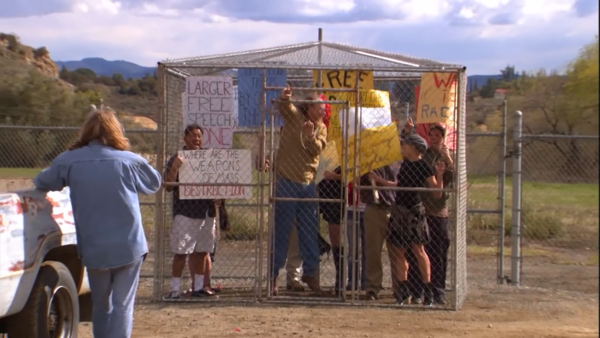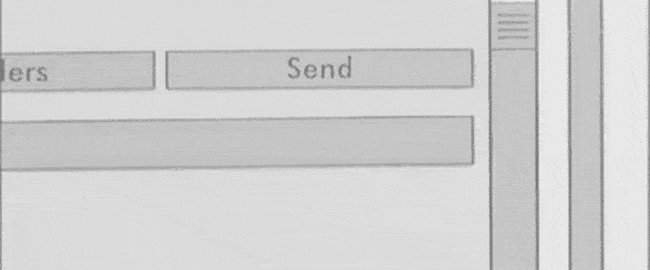
This is from Arrested Development, FYI. Hence the “Larger free speech zone” sign.
About two decades ago, a strange phenomenon picked up around large events and on college campuses. Essentially, given the U.S. laws around free expression (particularly the First Amendment), people who wanted to speak up at events were given a space to do so that was somewhat isolated. They could express whatever they wanted, as long as they stayed in that space.
This was a controversial move (and parodied effectively on Arrested Development), but totally legal based on legal interpretations of the time. The free speech zone was completely within the letter of the law, if not the spirit. Expressing your opinion in a public space in cramped parameters isn’t exactly what the founders were thinking of, methinks.
Some would say that the current public debate around free speech and digital culture—which lit like a firecracker thanks to Neil Young loudly getting his music removed from Spotify (leading Joe Rogan to apologize!), and continued to sizzle after Substack tried claiming, within legal limits, it was a free speech zone—would represent an example of these free speech zones being put in place on the internet.
However, I would argue it’s actually the opposite. There are vast swaths of the internet, much of which has still yet to be prospected, and hundreds of millions of people are focused on a few small corners. The problem is that these hundreds of millions of people walked into these public spaces and didn’t realize, hey, duh, you are no longer on government land, so as free as you’d like to be right now, you are actually on someone else’s property, and they set the rules, not the First Amendment.
If you are on Twitter or Facebook and you get banned, it is because you broke their rules, just as might be the case if you start harassing people in a hotel lobby or get too loud at the bar.

(Tomas Eidsvold/Unsplash)
The free speech zones are everywhere on the internet, and they are actually pretty spacious, not cramped in any way whatsoever. No walled gardens in sight. The problem is, they require slightly more work and slightly more scale to build than simply whipping up a Twitter account and saying what you really think about such-and-such behind a sock puppet account. It also dampens your reach to some degree, because you can’t say what you want in the best town squares, which, again, are privately operated.
(And about Substack: Color me skeptical. Is the company going to go to bat in court when questionable advice that their anti-vaccine writers share gets someone killed?)
If the problem that Neil Young’s many sudden critics highlighted—that people are sick of being censored on the internet—was true, we would have a much more vibrant open source community than we already do. Because, honestly, we’ve already solved for this. But the social media reaction to another tweet over the weekend, one largely related to the Substack half of this debate, does a great job of showing it’s not really about that.
https://twitter.com/jack/status/1487584287671169024
Let me set the stage: Jack Dorsey, the just-departed former CEO of Twitter, spitballs the idea that, if you really care about freedom, you should use Ghost, which is not only open source, but doesn’t take a massive cut of your profits in exchange for running a content management system. Valid point, if an interesting choice of figure to make it.
The replies and quote tweets on that thread were something, many of which were immediately skeptical of Dorsey’s motives, as well as of what Ghost was going to do with your content.
Mind you, Ghost has been around for close to nine years at this point. The initial announcement of the service hits its 10th anniversary later this year. It is a known entity. And the critics on Dorsey’s thread are looking at it as if it was sketchy and dangerous, that Substack had their best interests at heart.
Ghost is literally everything these people want—freedom without gatekeepers—and these users rejected it because of the messenger. Goddamn hilarious.
The contortions that these armchair critics do to protect their freedom of speech at a time when there are actually legitimate ways for them to freely express themselves that they’ve discarded is just comical.
They’re not afraid of losing their freedom of speech. They’re afraid of losing their free access to corporate-owned megaphones. As far as I can tell, megaphone access isn’t protected by the U.S. Constitution.
Don’t go on about your free speech if you’re not going to use the spaces set aside for you to express it.
Time limit given ⏲: 30 minutes
Time left on clock ⏲: 1 minute, 36 seconds



